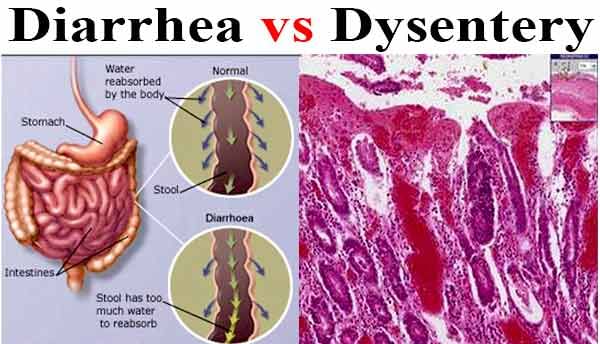Get the App
For Doctors
Login/Sign-up
Last Updated: Jan 10, 2023
BookMark
Report
Differences Between Diarrhea And Dysentery
Diarrhea is a condition that involves the frequent passing of loose or watery stools while dysentery is an intestinal inflammation, especially in the colon, that can lead to severe diarrhea with mucus or blood in the feces.
The major differences between diarrhea and dysentery are as follows:
S. N.
Diarrhea
Dysentery
1.
Diarrhea is presented as watery stool with no blood and mucus. Dysentery is presented as a mucoid stool that may be accompanied by blood.
2.
The patient may or may not be accompanied by cramps or a pain. The patient usually complains of cramps and pain in the lower abdominal area.
3.
Fever is less common in diarrhea. Fever is more common in dysentery.
4.
Diarrhea is a disease that affects the small bowel. Dysentery is a disease that affects the colon.
5.
Diarrheal infection is located and targets only intestinal lumen and upper epithelial cells. Dysentery not only upper epithelial cells are targeted but colon ulceration also results.
6.
There is no cell death in diarrhea and the infection is only caused because of the release of some toxins by the infecting agent. When a person gets dysentery, the upper epithelial cells are attacked and destroyed by the pathogen or disease causing agent.
7.
The antimicrobial that are used to treat diarrhea do not eradicate the toxin left behind. Treatment for dysentery can eradicate the pathogen that is causing the infection and stop the inflammation.
8.
The effects of diarrhea are not that serious, apart from a risk of dehydration. Dysentery can cause a lot of complications, if left untreated.
9.
Diarrhea is mostly viral. E. Coli can also cause watery diarrhea. Dysentery is mostly bacterial. E coli, shigella, and salmonella are the most common causative organisms
10.
Diarrhea does not need antibiotics. Oral rehydration solutions or intravenous fluid therapy may be used. Dysentery almost always requires antibiotic treatment. Intravenous antibiotics may be needed in severely ill children.


+1.svg)
